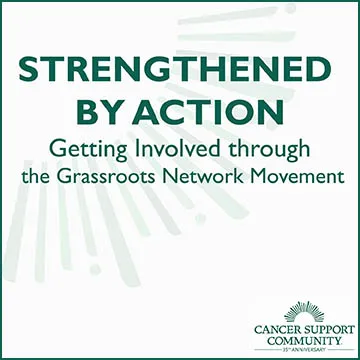Strengthened by Action: Join the Grassroots Network

For our 35th anniversary year, as part of our Fall Cancer Awareness campaign, the Cancer Support Community would like to highlight how you can make a difference through advocacy so that you and your loved ones can be “strengthened by action!”
As health care becomes increasingly political, cancer patients and advocates are stepping up to make their voices heard through the Grassroots Network at the Cancer Policy Institute.
The grassroots network is a way for advocates to not only receive information about the latest policy decisions and proposals that affect the cancer community, but to actively help shape those decisions. Advocates contribute as part of a network that interacts with Capitol Hill and other policy makers about issues that impact cancer patients and their loved ones.
Anyone can be an advocate. This network is for people who have been living with cancer for years as well as those who are newly diagnosed. It’s for people who have a family member with cancer or caregivers. It’s for anyone who wants to work toward a future where 15.5 million cancer patients and survivors have access to comprehensive, high-quality, and affordable care.
It’s not about having past experience or expertise in policy, it’s about feeling passionate about the issue on the table.
How to be an advocate:
- Research
Learn about your issue and become an expert. Educating yourself on treatments, statistics and current events in the cancer community will help you advocate your position to the people who make the decisions.
- Reach out
There are many things that you can do to advocate for your cause. Reach out to policy makers through emails, letters, postcards, phone calls, town halls and issue forums. Let your story, opinions and concerns be known.
- Share your story
Policy can seem like an abstract idea, but the words in a bill have a real effect on real people. Put a face to the statistics, and make it personal. Describe how the issue has impacted your daily life, your family, or your loved ones. Be clear and concise about the changes that need to be made. Calling attention to your story makes the issue real, urgent and local. Educating policy makers on your concerns and the real-world effects of their decisions helps to promote change.
- Alert the press
Journalists don’t just cover breaking news; they call attention to the issues and problems plaguing their communities. Pitch the issue to local media outlets, write letters to the editor, pen opinion editorials, participate in news conferences, express yourself through radio and television interviews or share the issue on social media. Talking about cancer through media outlets raises awareness about the issue to the general public and gets information in the hands of people who can do something about it.
- Vote!
Show up for elections to support the candidate who you trust to advocate for cancer patients. Representatives on the local, state and national level all have influence over public policy, so do your part to make sure these elected officials are allies to everyone affected by cancer.
Small actions can create lasting changes. Becoming a part of the Cancer Support Community Grassroots Network makes it easy to get involved in advocating for policy to ensures that “no one faces cancer alone.”